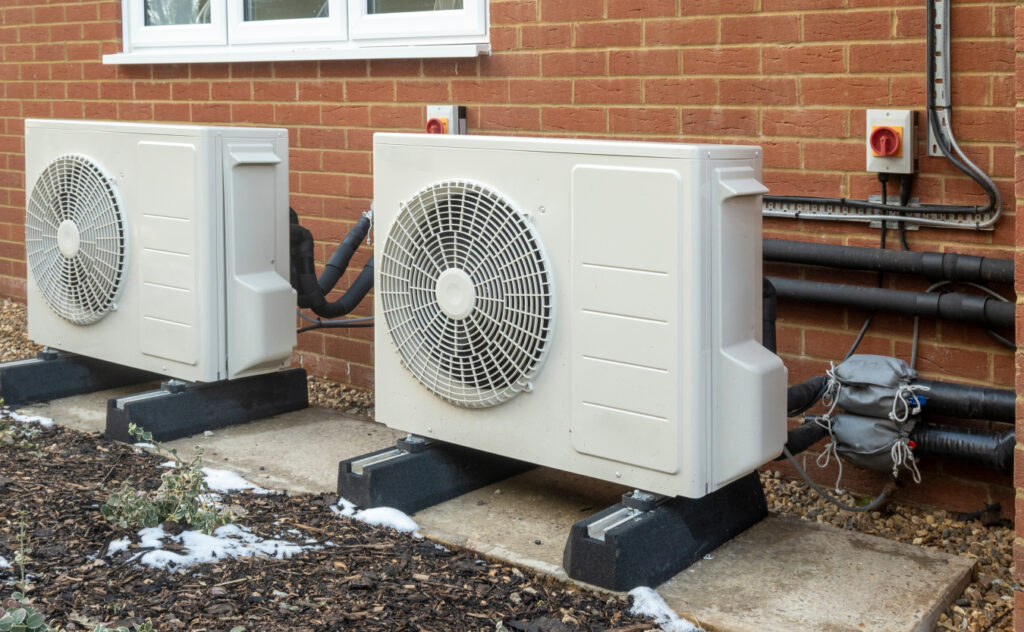
- A heat pump system transfers heat instead of generating it, offering energy-efficient heating and cooling.
- Air source heat pumps extract heat from the air, while ground source systems use underground energy.
- High efficiency metrics make heat pumps a cost-effective alternative to traditional HVAC systems.
- Regular maintenance ensures optimal performance—schedule your heat pump service today!
Keeping your home comfortable year-round doesn’t have to mean juggling separate heating and cooling systems. A heat pump system offers a versatile, energy-efficient solution that provides both warmth in the winter and cooling in the summer. But how does it work, and is it the right choice for your home?
Unlike traditional furnaces and air conditioners that generate heat or cold air, a heat pump system moves heat from one place to another. This simple yet powerful process makes it one of the most efficient climate control options available today. Let’s dive into how heat pumps operate, the different types available, and why they’re becoming a popular choice for homeowners looking to reduce energy costs.
How a Heat Pump System Works
A heat pump system operates on a simple principle: transferring heat instead of generating it. In colder months, it extracts heat from the outside air or ground and moves it indoors to warm your home. In warmer months, the process reverses—it pulls heat from inside and releases it outside, cooling your home like an air conditioner.
The system consists of three main components:
- An outdoor unit – Contains a coil and a fan to help transfer heat.
- An indoor unit – Circulates the warmed or cooled air throughout your home.
- A refrigerant loop – Absorbs and releases heat, facilitating the transfer process.
Because a heat pump system doesn’t burn fuel like a furnace, it operates much more efficiently, helping homeowners lower their energy bills while reducing their carbon footprint.
Types of Heat Pumps: Air Source vs. Ground Source
There are two primary types of heat pumps, each with its own unique benefits. Choosing the right one depends on your home’s location, climate, and efficiency needs.
Air Source Heat Pumps
The most common type, an air source heat pump, extracts heat from the outdoor air—even in cold temperatures—and transfers it indoors. These systems are highly efficient, especially in moderate climates, and can significantly reduce heating and cooling costs compared to traditional HVAC systems.
Benefits of Air Source Heat Pumps:
- Lower upfront costs compared to ground source options
- Easier and faster installation
- Works efficiently in most climates, especially with newer models designed for colder temperatures
Ground Source Heat Pumps (Geothermal Heat Pumps)
A ground source heat pump, also known as a geothermal heat pump, operates using heat stored beneath the earth’s surface. Instead of extracting heat from the air, it relies on underground pipes to transfer warmth. Since ground temperatures remain stable year-round, these systems offer even greater efficiency.
Benefits of Ground Source Heat Pumps:
- Higher efficiency metrics due to consistent underground temperatures
- Longer lifespan compared to air source systems
- Can provide both heating and cooling with minimal energy consumption
While ground source heat pumps are incredibly efficient, they require more extensive installation, including digging or drilling for underground piping, which can make them more expensive upfront.
Efficiency Metrics: Why Heat Pumps Save Energy
One of the biggest reasons homeowners switch to a heat pump system is its impressive energy efficiency. Instead of burning fuel like a furnace, it simply transfers heat, requiring far less energy to operate.
When comparing heat pumps, look for these efficiency metrics:
- SEER (Seasonal Energy Efficiency Ratio): Measures cooling efficiency; higher SEER ratings indicate better performance.
- HSPF (Heating Seasonal Performance Factor): Measures heating efficiency; the higher the HSPF, the more efficient the system.
- COP (Coefficient of Performance): Shows how much heating or cooling is produced per unit of energy consumed. A COP of 3 means the system produces three times the energy it uses.
Modern heat pumps have high efficiency metrics, often outperforming traditional furnaces and air conditioners in terms of energy savings. This translates to lower utility bills and reduced environmental impact.
Is a Heat Pump System Right for You?
Heat pumps are an excellent option for many homeowners, but they may not be ideal for every situation. Here are a few factors to consider before making the switch:
✔ Climate: While newer air source models work well in colder regions, extremely low temperatures can reduce efficiency. Ground source systems provide consistent performance in all climates.
✔ Existing HVAC System: If you already have ductwork in place, a heat pump can be an easy upgrade. For homes without ducts, ductless mini-split heat pumps are a great alternative.
✔ Budget: While heat pumps can have a higher upfront cost, their energy savings often make up for the initial investment over time.
✔ Energy Goals: If you’re looking to reduce your reliance on fossil fuels and lower your carbon footprint, a heat pump is one of the best choices available.
Schedule Your Heat Pump Service Today
A heat pump system offers an energy-efficient way to keep your home comfortable all year long, but like any HVAC system, it needs regular maintenance to perform at its best. Whether you’re considering a new installation or need service for your existing system, the experts at CJS are here to help.
Ensure your heat pump runs efficiently season after season—schedule your heat pump service today!





